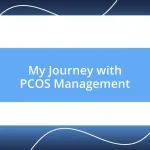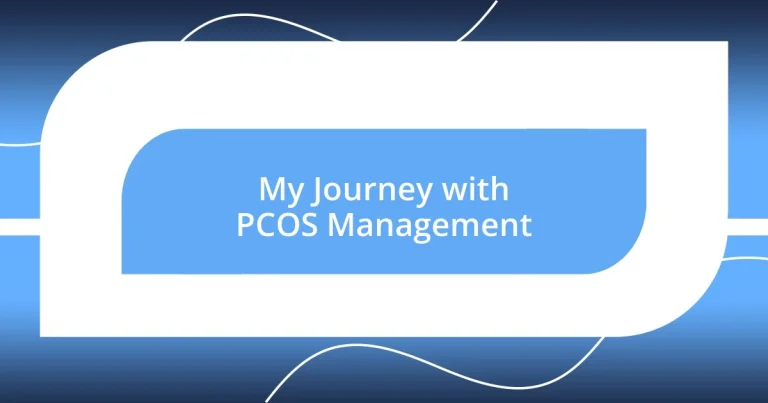Key takeaways:
- PCOS is a complex hormonal disorder with unique symptoms, including irregular periods, hirsutism, and weight changes, often linked to insulin resistance.
- Lifestyle changes such as balanced diet, regular exercise, adequate sleep, stress management, and hydration can significantly improve PCOS symptoms.
- Community support and sharing personal experiences can empower individuals managing PCOS, highlighting the importance of connection and shared journeys in dealing with the condition.
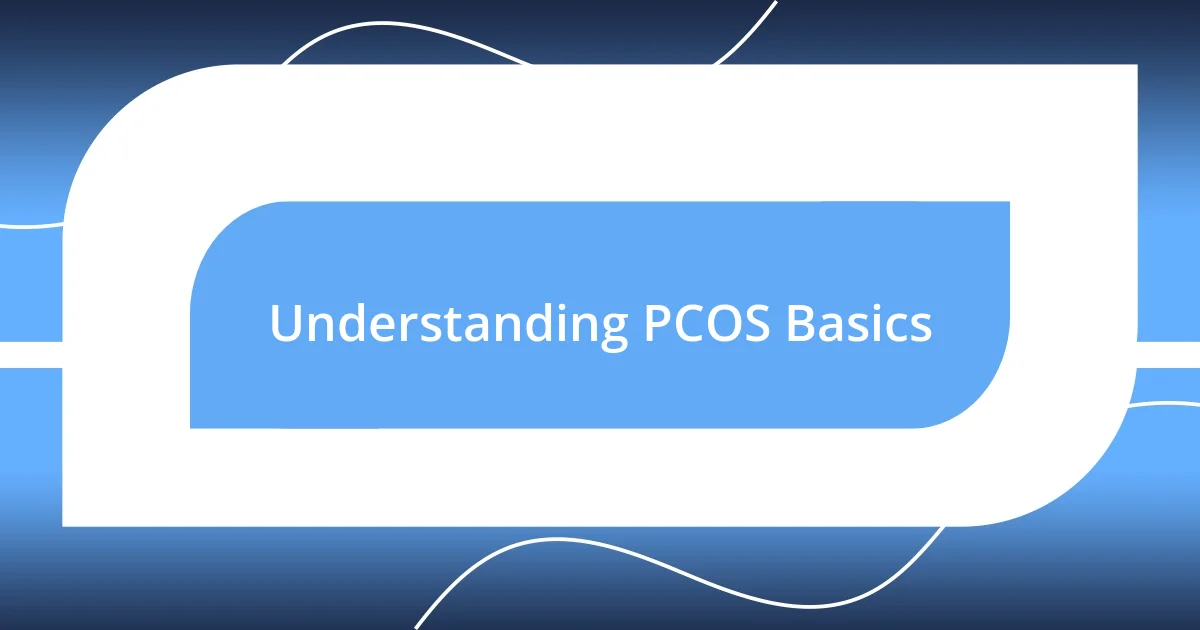
Understanding PCOS Basics
Polycystic Ovary Syndrome (PCOS) is a complex hormonal disorder that affects many women of reproductive age, often manifesting in irregular menstrual cycles, excess hair growth, and weight fluctuations. When I first learned about PCOS, I felt a wave of relief wash over me; finally, there was a name to describe my struggles. Have you ever experienced that moment of recognition, when everything that felt so confusing suddenly makes sense?
The condition is often associated with insulin resistance, which can lead to challenges with weight management and mood fluctuations. I remember feeling frustrated at times, battling cravings and the emotional rollercoaster that came with my hormonal imbalance. It’s essential to understand that every woman’s experience with PCOS is unique—some might face more severe symptoms than others, but knowing you’re not alone can be incredibly comforting.
Diagnosing PCOS typically involves a combination of physical examinations, blood tests, and ultrasounds, which can feel overwhelming. I once found myself in a doctor’s office, sweating bullets, anxious about what they might find. But understanding the basics of PCOS allows you to engage in your healthcare more effectively. Have you considered how empowerment through knowledge can reshape your approach to managing PCOS?
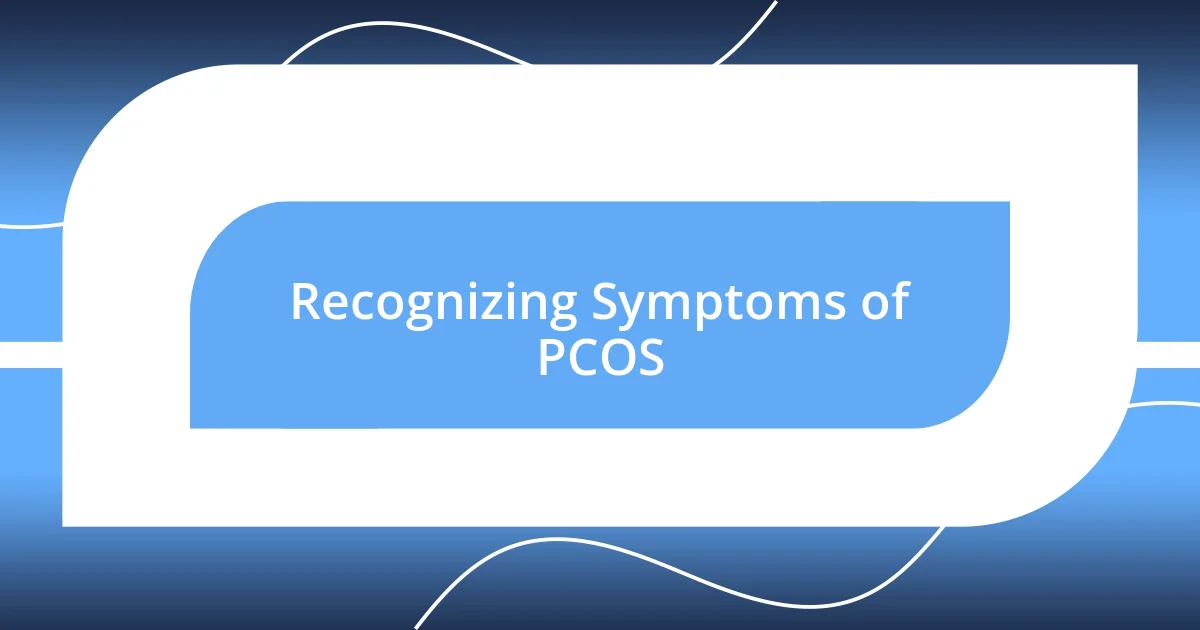
Recognizing Symptoms of PCOS
Recognizing the symptoms of PCOS can sometimes feel like piecing together a puzzle. For instance, I initially attributed my irregular periods to stress and lifestyle, not realizing they were a sign of something more significant. Skin changes, like acne and dark patches, may also arise, and during my own experience, I wondered if my face was betraying me. It’s fascinating how our bodies communicate often subtle messages; recognizing these clues is the first step toward understanding PCOS.
Another key symptom to look out for is hirsutism, which is excessive hair growth in areas where men typically grow hair, such as the face and chest. I recall being shocked when I first noticed hair in those places; it felt like a cruel twist of fate. It took time for me to recognize that this was a symptom of hormonal imbalance rather than something intrinsically wrong with me. Keeping an eye on changes in hair growth, along with weight management struggles, can help guide you to an informed conversation with your healthcare provider.
Lastly, emotional health can suffer due to the hormonal fluctuations associated with PCOS. I’ve experienced mood swings that seemed to come out of nowhere, reminding me that emotional symptoms are just as significant as the physical ones. Staying aware of how you’re feeling—both emotionally and physically—can empower you to seek support when needed and advocate for yourself during healthcare visits.
| Symptom | Description |
|---|---|
| Irregular Periods | Infrequent, absent, or prolonged menstrual cycles. |
| Hirsutism | Excess hair growth in areas typically associated with male patterns. |
| Weight Changes | Unexplained weight gain or difficulty losing weight. |
| Skin Issues | Acne, oily skin, or dark patches (acanthosis nigricans). |
| Mood Swings | Increased irritability, anxiety, or depressive symptoms. |
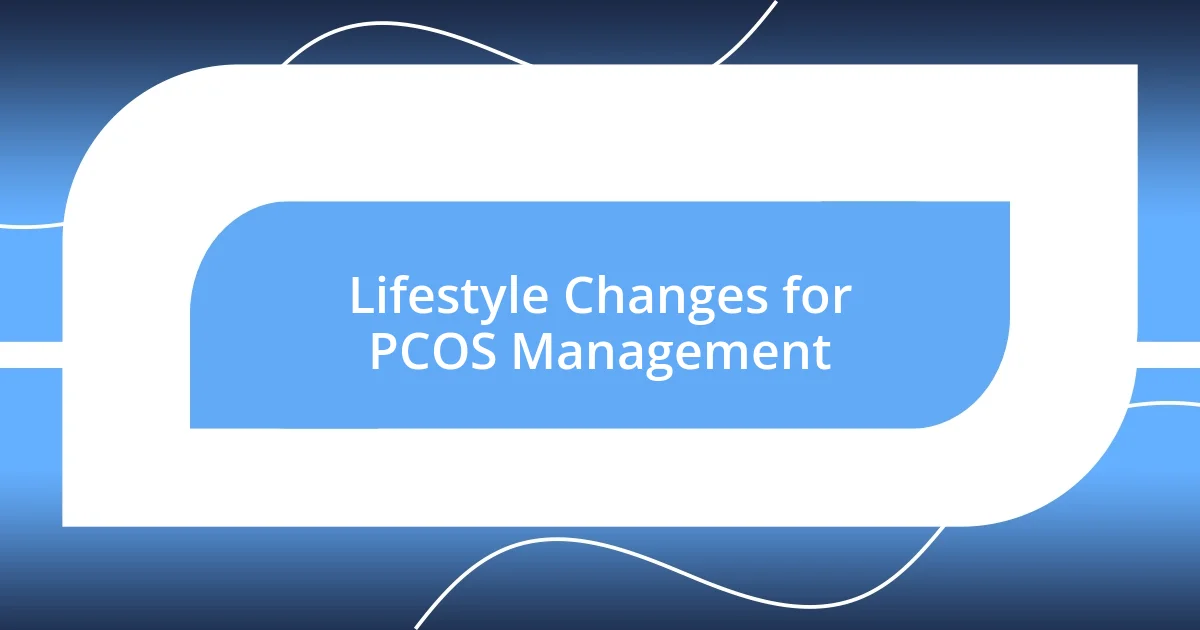
Lifestyle Changes for PCOS Management
Lifestyle changes play a crucial role in managing PCOS effectively. From my experience, small shifts in daily habits can lead to significant improvements in symptoms. For example, I found that integrating regular exercise into my routine not only helped with weight control but also boosted my mood. There’s something empowering about moving your body, isn’t there? Just focusing on a balanced diet and making mindful choices felt like a true game changer.
Here are some impactful lifestyle changes you might consider:
- Balanced Diet: Emphasize whole foods, including fruits, vegetables, lean proteins, and healthy fats. I felt a noticeable difference when I reduced processed sugar, which had been a major culprit in my cravings.
- Regular Exercise: Aim for at least 150 minutes of moderate activity each week. I discovered that even walking or yoga brought me a sense of calm and clarity.
- Adequate Sleep: Prioritize 7-9 hours of quality sleep per night. After a week of consistent sleep, I noticed my energy levels soared—an unexpected yet welcomed shift.
- Stress Management: Incorporate mindfulness practices like meditation or deep-breathing exercises. I vividly remember a particularly stressful week where just ten minutes of breathing exercises transformed my anxious thoughts into calm reflections.
- Hydration: Drink enough water throughout the day; staying hydrated made my skin feel better and improved my overall well-being. It’s something so simple, yet so effective.
Through my journey, I learned that these seemingly minor adjustments have been foundational in steering my health in a more positive direction. It’s all about finding what resonates with you!
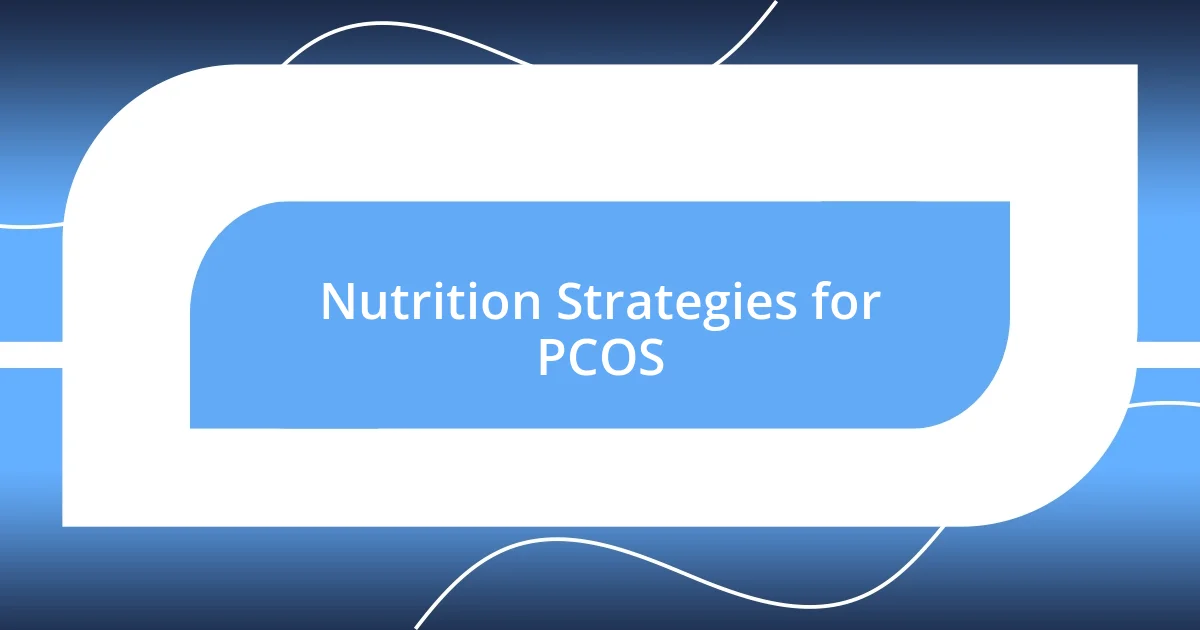
Nutrition Strategies for PCOS
Navigating the world of nutrition with PCOS can feel overwhelming, but it doesn’t have to be. Personally, I found that reducing my carbohydrate intake made a noticeable difference in my symptoms. Choosing low-glycemic foods helped stabilize my blood sugar levels, which in turn improved my energy and mood. It’s interesting how something as simple as changing what I ate could shift the way I felt day to day.
Incorporating more fiber into my meals was another strategy that worked really well for me. Foods like whole grains, legumes, and plenty of fruits and vegetables not only kept me feeling fuller longer but also aided in digestion. I remember the sense of satisfaction I felt after a hearty lentil soup; it wasn’t just nutritious, but it also felt like a comforting ritual for my body. Call me biased, but I believe cooking at home gives me more control over my ingredients, ensuring I’m crafting meals that genuinely support my health.
Have you ever thought about the magic in meal prepping? For me, taking a couple of hours each week to prepare nourishing meals was transformative. It not only saved time but also reduced stress around mealtime, letting me avoid spur-of-the-moment unhealthy choices. Having a fridge stocked with healthy options made it easier to stick to my plan, reducing the temptation of snacks that wouldn’t serve me well. It’s those little changes that helped me regain a sense of control over my PCOS journey.
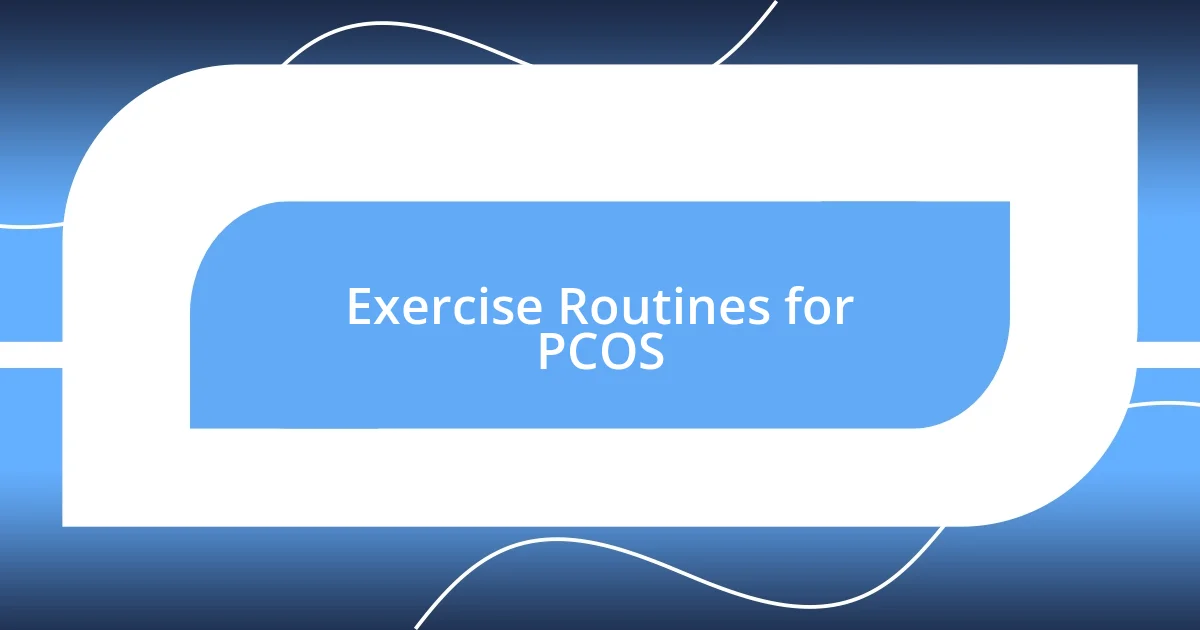
Exercise Routines for PCOS
Incorporating an exercise routine into my life was a pivotal step in managing my PCOS symptoms. I remember the first time I completed a 30-minute workout; I felt an exhilarating sense of accomplishment that lingered well beyond the session. It was as if every endorphin released was saying, “This is what your body craves!” Even now, I schedule my workouts like appointments, recognizing the profound impact they have on my physical and mental well-being.
I quickly learned that variety in my exercise routine kept things engaging and enjoyable. On some days, I would lace up my running shoes and hit the pavement, while on others, I would roll out my yoga mat and embrace the serenity of stretching. This mix not only helped prevent burnout but also targeted different muscle groups, enhancing my overall strength and flexibility. It became an exploration of what my body could do, sparking an inner joy that diminished the frustration I often felt with PCOS.
One of the most unexpected benefits of my exercise journey was how it fostered a strong connection with a community of like-minded individuals. Joining a local fitness class not only pushed me to challenge my limits but also provided a support system that made my journey feel less lonely. Have you ever felt that rush of camaraderie during a group workout? I cherish the moments spent sharing laughs and sweat with others who understand the ups and downs of managing PCOS. This aspect of social engagement added depth to my exercise routine, reinforcing that movement really can be a joyful quest rather than just another task on the to-do list.
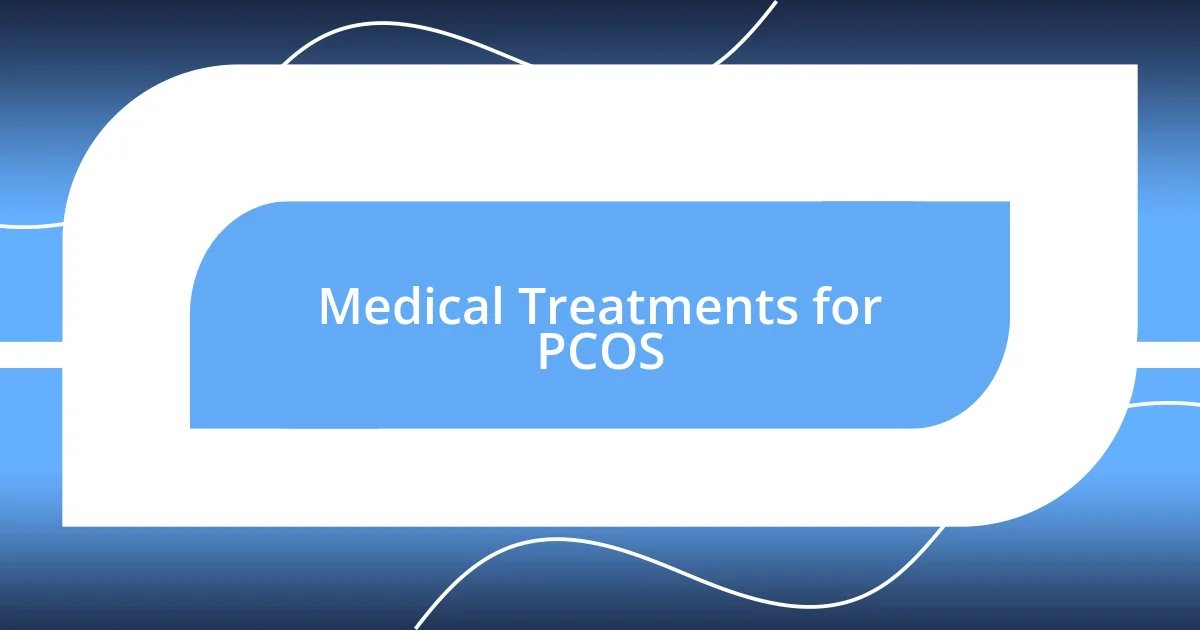
Medical Treatments for PCOS
The landscape of medical treatments for PCOS is diverse, catering to various symptoms and personal needs. I remember sitting in my doctor’s office, feeling a mix of hope and apprehension as we discussed medication options. Starting with hormonal contraceptives was a game-changer for me; they helped regulate my menstrual cycles and reduce those pesky ovarian cysts. Has anyone else felt that blend of relief and frustration while trying to find the right fit?
To complement my medication, insulin-sensitizing drugs like metformin were also introduced into my regimen. While I initially had my reservations, the results were quite remarkable; not only did it help manage my insulin levels, but it also contributed to weight management. I vividly recall being astonished when I realized I felt more energetic and balanced, suggesting that managing PCOS often requires a combination approach—medication and lifestyle adjustments working together in harmony.
Additionally, treatment isn’t solely about medication. The importance of regular check-ins with healthcare providers cannot be overstated. I’ve had moments where I felt frustrated with the slow progress, but those conversations provided me with clarity and reassurance. It’s as if I found a partner in navigating my journey—one who understood that management extends beyond prescriptions. Have you ever felt a sense of empowerment when your doctor genuinely listens? Finding that connection boosted my resolve to tackle my symptoms head-on.
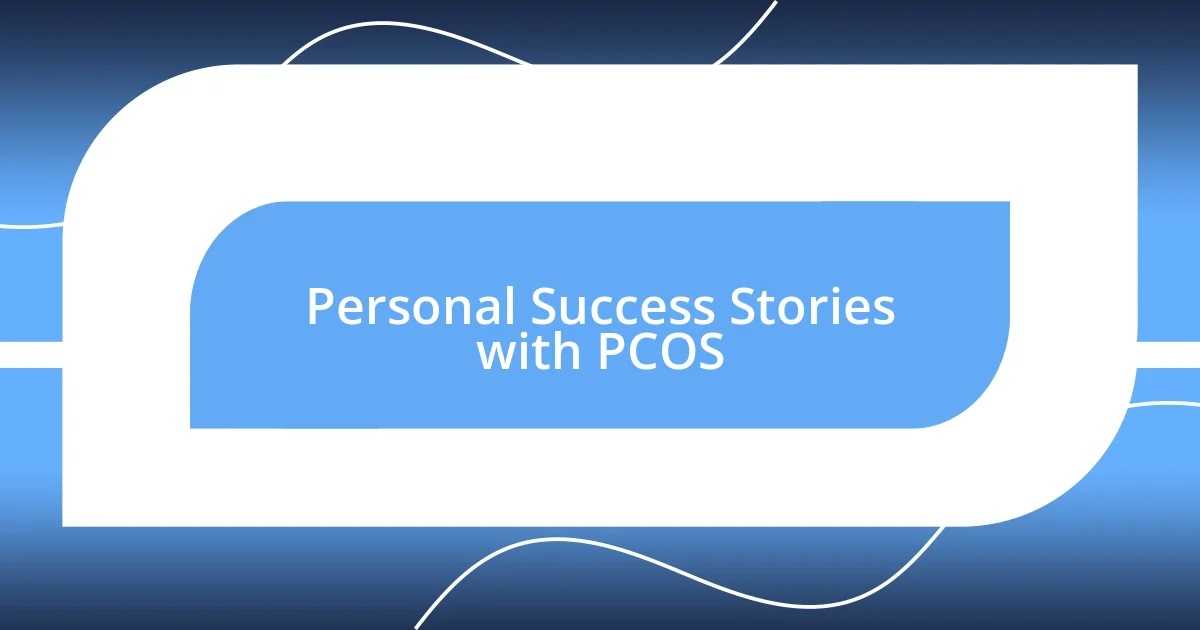
Personal Success Stories with PCOS
Stepping out of my comfort zone, I decided to start an online support group for women with PCOS. What started as a small gathering of friends quickly blossomed into a diverse community. Many shared their triumphs and setbacks, creating a tapestry of experiences that resonated at a deep emotional level. I often found myself amazed by the strength in vulnerability; could it be that sharing our struggles not only lightens the burden but also deepens our connections with one another?
One unforgettable success story comes from a member who embraced a plant-based diet. She candidly shared how transitioning to greener meals transformed not just her energy levels but also her self-image. Watching her flourish reminded me that the journey can have many beautiful turns. Have you ever felt inspired by someone else’s growth? It reinforced the idea that while managing PCOS can feel isolating, there’s strength in community that can empower us all.
Then there was the member who diligently practiced mindfulness and meditation—a technique I had always been curious about. Just listening to her recount how these practices lessened her anxiety around PCOS was enlightening. I began to wonder if incorporating mindfulness into my routine would offer similar benefits. The more we exchanged these personal success stories, the clearer it became: every journey with PCOS is unique, yet we’re all walking a path toward better health and understanding together.








